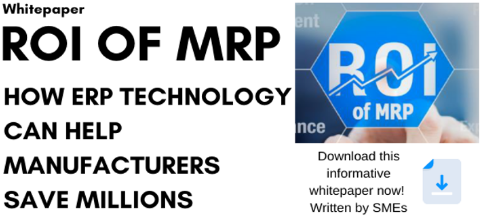Businesses that choose cloud solutions do so to achieve various benefits. According to the 2012 ERP Benchmark Survey report published by The Aberdeen Group, there are six main benefits that organizations cited for choosing cloud solutions. These are:
-
Lower Total Cost of Ownership (TCO)
The major reason why companies choose cloud ERP is the lower cost of ownership. Cloud solutions are charged on a subscription basis. Organizations only pay for the amount of service they wish to consume.

The lower TCO of cloud ERP means companies can achieve ROI faster than those using on-premise solutions. According to the Nucleus Research: cloud application projects deliver 2.1 times the ROI of on-premise ones – up 24 percent since 2012.
-
Lower Up-front Implementation Cost
Implementing on-premise ERP is very costly. This is mainly because organizations have to cater for all the costs involved including the software, infrastructure, upgrades, data conversions, implementation, and so on.
Cloud ERP vendors eliminate expensive up-front costs for users since they handle the infrastructure, deployment, upgrades, etc. on their own. The vendors can also afford to charge lower subscription fees per user by taking advantage of economies of scale.
-
Lower Cost of Upgrading
The cost of upgrading ERP can be costly for any organization. With time, ERP vendors release patches to enhance their solutions and customers have no option but to upgrade their systems or risk incompatibilities, security issues, instabilities, and other problems.
Cloud ERP software makes upgrading and installing updates easier for customers. Since the solution is available on the cloud, vendors can automatically update or upgrade them without requiring any input from users. Moreover, cloud updates are usually offered for free and do not require complex configurations such as is the case with some on-premise systems.
-
Ease of Implementation
Cloud ERP can be deployed easily and faster than on-premise solutions. Implementing a cloud ERP software causes less disruption to a company’s business processes. Lower deployment times means less requirements for outside help, which means lower implementation cost.
The majority of cloud ERP systems are modeled on software solutions that employees are already familiar with. Thus, it is easy to install and get started with them. Moreover, the solutions feature user-friendly and familiar interfaces, which reduce the learning curve of employees.
-
Scalability
As your business grows, you cannot outgrow your cloud solution. There are many ways to expand the ERP cloud without having to shop for new software. For example, most vendors offer user packages suitable for the majority of businesses they are targeting.
During the initial stages of your company, you may opt for a lower package with basic functionality important for your operations. As your business grows, you can upgrade your consumption by opting for higher packages with more robust functionality. The same also applies in case your business volume decreases; you can opt for a lower package or plan of the ERP solution.
-
Data on Demand
One of the advantages of cloud ERP is that users can access data from multiple locations. As business in the 21st century becomes more globalized, organizations are establishing plants in different geographic regions and need executives and employees to be able to access critical data on performance and the processes of the business.
Cloud ERP software allows users to access data from anywhere, provided they have an Internet connection and the credentials of the organization's users. Moreover, security is at the forefront of cloud solution providers. The majority of vendors offer 128-bit encryption to ensure the integrity of their users’ accounts.
The above are some of the reasons why many small and medium-sized businesses are opting for cloud based ERP software rather than on-premise solutions. Some larger companies are, however, adopting a hybrid solution of on-premise systems with some cloud functionality. IT management can help to determine which route the organization should take depending on the future of its ERP needs.
 6 Reasons Why You Should Choose Cloud ERP Software">
6 Reasons Why You Should Choose Cloud ERP Software">
